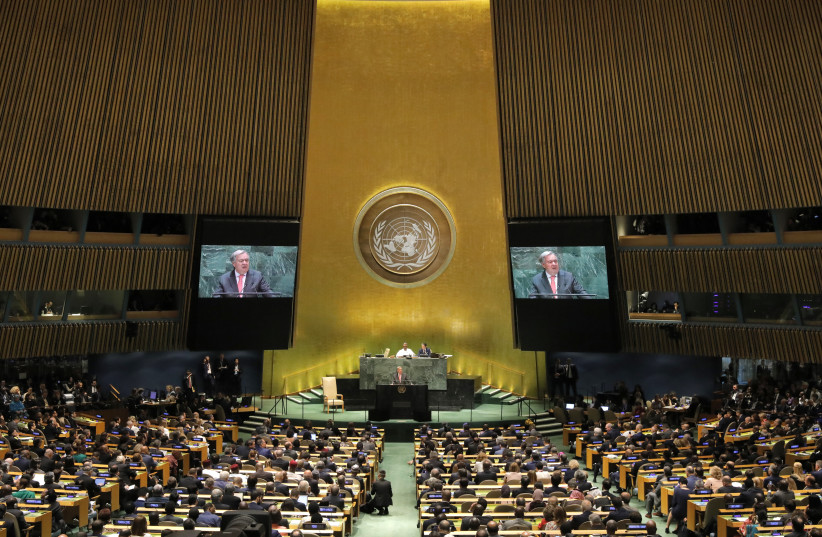From tech conferences to UN agencies, such as the World Health Organization, October 7 brought to the fore two of the most critical questions of the day – to be or not to be? to disengage or reengage?
Community leaders and lay men and women wonder which strategy proves more effective in an upside-down world: elimination of connections with institutions associated with embedded antisemitism and anti-Zionism, or working with and within these institutions, even during challenging times, hoping to reform and change from within.
No one is immune. Jewish individuals around the world make those decisions on a daily basis. Staying silent is not an option; quite often the answer would affect our communities for years to come. Institutions are looking for guidelines.
It is often easy to react quickly to any statement made by an organization’s leader, as if the world is a black-and-white reality. Yet, a more nuanced approach is needed in order to avoid a crisis, which will take years to address and recover.
The Israeli government itself has changed its view on the same matters. The government did not send a legal representative to the International Court of Justice case two decades ago to defend the West Bank security barrier. The thought was that the process is corrupt and illegitimate, and Israel should disengage. Nevertheless, in the recent international legal cases derived from the current war with Hamas, reengagement was the chosen strategy, sending the best and the brightest to represent the country in the various legal procedures. The engagement is being perceived as critical for Israel’s legitimacy and future actions.

The tension between disengagement and reengagement is global. China, for example, used to have a limited representation in international institutions that are controlled by the US or the West. The Asia Infrastructure Investment Bank, which was initiated by the Chinese leadership, started as a tool to counter the West’s dominance in regional development and investment banks. Yet, now Chinese experts participate in all major international organizations and pursue leadership roles in them, in order to change from within and counter what is perceived by them as over-influence by the American voice.
Developing a constructive framework
THE ISRAELI government, with input from all major Jewish international institutions, should develop a constructive framework. Such a framework will provide thoughtful tools to assess the true impact of each decision and what is at stake. Several factors can be part of such a framework.
First, current events should also be analyzed through the lenses of historical performance. Institutions that had very good relationships with the Jewish state cannot be ignored just because of one or two statements by hostile individual leaders.
Second, it is necessary to analyze the ability to make a positive change within the current infrastructure. Thus, for example, Israel has changed its approach to many economic arms of the multilateral system, with major efforts to contribute knowledge and people, and to run candidates for senior positions. State Comptroller Matanyahu Englman, for example, was selected recently to become the first Israeli president of the European Organization of Supreme Audit Institutions. There are more cases like that to come.
If an assessment leads to the conclusion that there are no prospects to reform the institution or affect its leadership and values, a more dismissive strategy may be relevant.
In addition, sometimes just being there has its own importance. When people challenged or questioned Israel’s participation in the Eurovision Song Contest, it was clear to Israel’s decision-makers that the participation is historically important in order to support Israel’s prominent place in the league of nations and its stellar artistic contribution. Participation is often an obligation.
Also, it is important to remember that disengagement creates a vacuum that is often being filled by other, more hostile participants. Without the Israeli and Jewish voices, the narrative can be written by others.
Moreover, if an international organization is being boycotted by a Jewish group that moves forward independently, other institutions feel the pressure to act. Inconsistency within our communities on this issue may negatively affect the efficiency of any policy and framework.
Finally, the forced participation and reengagement in processes and organizations, such as the International Criminal Court or International Court of Justice, create know-how in areas where Israel lacks knowledge and talent. The recent international legal cases improved Israel’s international law practice and created a whole generation of market leaders. Israel’s close relationships with the international financial system, including the World Bank and the International Monetary Fund, have accelerated Israel’s leadership in fighting terrorism financing, including training other international agencies in this field.
Israel has gone a long way since the early days of open and direct fight vis-à-vis international forums and commissions, such as the human rights conference also known as the Durban Conference, and the Goldstone Report, produced by the Human Rights Council, a United Nations agency. Today, Israel’s diverse responses include banning visa entries and reducing budgets on one side of the spectrum, all the way to full participation and contribution to some of the most influential forums worldwide.
A thoughtful framework is needed. In recent years, we saw how the engagement with the international film and sports industries brought Israel’s top talent to international screens and major sports venues. Yet, there are times where disengagement is a must.
It remains to be seen where we are heading from here, but the discussion itself has a tremendous value that would make governance, and our lives, much better.
The writer is an international economic law professor, a leading media commentator, and a senior adviser to multinational companies and organizations.
